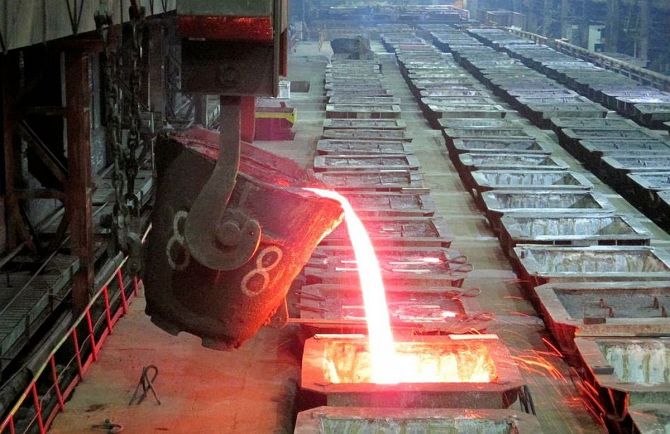The Indian government has made a strategic decision to recognise the importance of 30 essential minerals, including lithium, cobalt, nickel, graphite, tin, and copper, which are critical to the country’s economic prosperity and national security. These minerals are critical in a variety of industries, including clean technologies, information and communication technology, and innovative manufacturing inputs.

Critical Minerals and Their Applications
- Graphite: Graphite is commonly utilised in the production of electric vehicle (EV) batteries. It is an important component in lithium-ion batteries, which power EVs and other portable electronic devices.
- Lithium: Another crucial material in the manufacture of EV batteries is lithium. Lithium-ion batteries are commonly utilised in electric vehicles to provide energy storage capacity. Other applications for lithium include renewable energy storage systems.
- Cobalt is a crucial mineral that is necessary for the creation of lithium-ion batteries, which are utilised in electric vehicles. It improves the battery’s stability and performance. Cobalt is also used in the aerospace, communications, and defence industries. It is employed in the production of combat jets, drones, and other vital equipment.
- Rare Earth Minerals: Although only in minute proportions, rare earth minerals serve an important role in the production of semiconductors and high-end electronics. These minerals contain elements such as neodymium, dysprosium, and praseodymium, which are necessary for the production of magnets used in electric motors, wind turbines, and other high-tech applications.
- The second stage entailed inter-ministerial meetings with several ministries in order to identify minerals vital to their respective industries. Power, Atomic Energy, New and Renewable Energy, Fertilisers, Science and Technology, Pharmaceuticals, and NITI Aayog all provided valuable feedback and suggestions.
The third stage’s goal was to create an empirical formula for determining mineral criticality.
- This step was inspired by the European Union’s methodology, which takes economic relevance and supply risk into account as two main criteria. A list of 30 important minerals for India was produced based on this rigorous assessment procedure.
- The second stage entailed inter-ministerial meetings with several ministries in order to identify minerals vital to their respective industries. Power, Atomic Energy, New and Renewable Energy, Fertilisers, Science and Technology, Pharmaceuticals, and NITI Aayog all provided valuable feedback and suggestions.
- The third stage’s goal was to create an empirical formula for determining mineral criticality. This step was inspired by the European Union’s methodology, which takes economic relevance and supply risk into account as two main criteria. A list of 30 important minerals for India was produced based on this rigorous assessment procedure.
The Importance of Creating a Specialised Agency
- The group in charge of selecting vital minerals stressed the importance of establishing a National Institute or Centre of Excellence for critical minerals, such to Australia’s CSIRO.
- This planned centre will update the list of important minerals on a regular basis, formulate a critical mineral strategy, and carry out functions critical to the country’s development of an effective value chain.
The importance of an independent source of Critical Minerals and their influence
- Key Industry Facilitators: Clean energy, electronics, transportation, defence, and industry all rely on critical minerals. They make it possible to manufacture modern technology such as electric vehicles, renewable energy systems, high-tech gadgets, and communication devices. These industries would face considerable issues in meeting the expanding worldwide demand for their products if essential minerals were not available on a consistent basis.
- Critical Minerals: Critical minerals are essential for driving technological progress and innovation. They supply the raw materials required for the development and advancement of clean technologies, energy storage systems, telecommunications devices, advanced electronics, and defence technology. Access to key minerals promotes the development of cutting-edge technologies, boosts competitiveness, and promotes sustainable practises in a variety of industries.
- Move to renewable Energy: Critical minerals are critical in the move to renewable energy sources. Minerals such as lithium, cobalt, nickel, and rare earth elements are essential in the manufacture of high-performance batteries used in electric vehicles and renewable energy storage systems. Countries may expedite the adoption of sustainable energy technology, reduce greenhouse gas emissions, and minimise the effects of climate change by assuring a stable supply of these minerals.
- Economic Growth and Job Creation: Critical minerals help to drive economic growth by supporting industries that create jobs and stimulate innovation. Domestic production and processing of essential minerals generates jobs along the value chain, including exploration, mining, processing, manufacturing, and R&D. Countries can increase economic growth, improve competitiveness, and reduce reliance on foreign imports by building a thriving critical minerals sector.
- National Security: Relying on foreign suppliers for vital minerals may jeopardise national security. Supply chain disruptions caused by geopolitical causes, trade conflicts, or market changes can have a considerable influence on industries critical to the defence, infrastructure, and key sectors. Countries can improve their resilience, decrease vulnerabilities, and protect national security interests by identifying and exploiting local sources of essential minerals.
- Sustainable Resource Management: Identifying and managing key minerals contributes to responsible resource use and environmental care. Countries can meet their mineral needs while addressing social, environmental, and governance problems by assuring responsible mining practises, supporting recycling and circular economy techniques, and minimising the environmental impact of mineral extraction and processing.
Source: https://indianexpress.com/article/explained/explained-sci-tech/centre-identifies-30-critical-minerals-why-how-and-importance-of-the-exercise-8692936/
